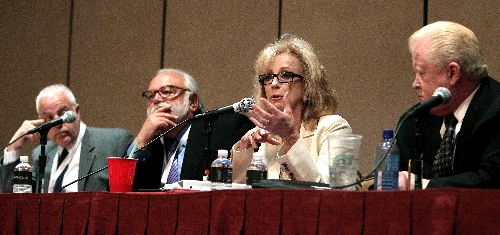With Internet, bigger show of hands for poker

For more than a decade, brick-and-mortar gaming companies claimed that Internet gambling would cannibalize their business by turning customers who would normally visit a casino into stay-at-home gamblers.
They also pursued legislation that would make Internet gambling illegal. But with the rapid growth of online poker and the $4 billion to $6 billion generated annually by U.S. poker players, some companies have changed their minds.
For example, Caesars Entertainment Corp., with its World Series of Poker brand, has reached deals with companies in Europe to expand the brand overseas. Nevada regulators also approved Caesars Entertainment’s relationship with 888 Holdings.
Despite the recent crackdown on PokerStars, Full Tilt Poker and Absolute Poker by federal authorities, the industry still seeks federal legislation that would allow Las Vegas companies to operate legally in cyberspace.
Mark Tenner, a partner at Concept Development Group, defined a poker player as someone who plays for real money online or in a licensed casino at least twice a year.
He told casino executives, government regulators, industry lobbyists and others Tuesday at the iGaming North America conference at the Monte Carlo that the number of people who describe themselves as poker players has jumped from 250,000 in 2000 to 65 million today.
"The numbers will continue to grow, which will have a positive effect on brick-and-mortar casinos," said Tenner, who hosted an hourlong discussion on Internet gaming’s effect on the casino industry.
While online poker is at the center of debate, gaming executives say online offerings could expand to include slot machines, roulette and other table games as well as sports wagering.
Jan Jones, senior vice president of communications and government affairs at Caesars Entertainment, said the future of casinos is tied to the Internet.
"Gen X and Gen Y make all of their decisions online," she said. "If we don’t have a significant presence online they will make different decisions."
Jones admitted the "industry has been fearful of competition," first from Atlantic City, then Native American casinos and now the Internet.
Steve Rittvo, chairman and CEO of The Innovation Group in Basalt, Colo., said the gaming industry could face a fate similar to that of the horse racing industry, which was slow to "react as its core customer base started dying off."
He stressed that he doesn’t "see cannibalization happening" if online poker is legalized.
"We see growth from all categories," said Rittvo, adding that it would allow companies to offer incentives to drive traffic from the Internet to casinos.
Bellagio poker operations director Doug Dalton agreed with Rittvo, saying online poker had driven the growth of the hotel-casino’s poker offerings.
"Brick-and-mortar casinos were concerned online poker would take a lot of customers. What we found was (that) it brought people into our poker room," Dalton said.
Dalton said online poker allowed people to become more comfortable with the game before walking into a casino and playing for real money.
The question remains whether online poker should be legalized on a state-by-state basis or by federal legislation. Jones has argued for federal legislation.
Rittvo said federal approval would be a win for gaming companies, which have the ability to market on a larger scale and cannibalize smaller regional and Native American casinos.
If approved on a state level, it’s a win for smaller gaming companies and tribal casinos that cater to a local market. Jones suggested that federal legislation would not be a death sentence for smaller gaming companies, which could partner with Caesars and others to create regional hubs.
Contact reporter Chris Sieroty at csieroty@reviewjournal.com or 702-477-3893.
Indictments finger execs, not game, lawyer saysFederal indictments targeting top executives of three top online poker companies aren’t attacks against Internet gambling itself, a defense lawyer known for handling complex financial and corporate crimes cases told a gambling industry group Tuesday.
Fred Heather of K&L Gates LLP told casino executives, government regulators and others at the iGaming North America conference in Las Vegas that the case against 11 people associated with PokerStars, Full Tilt Poker and Absolute Poker hinges on financial crimes that are separate from the act of wagering money on Web games, which has become a multibillion-dollar industry in the United States.
"The heart of this case is this collateral activity, which constitutes bank fraud and money laundering," Heather said. "One of the indications of that is the fact that the government isn’t resisting the return of money to the players through their deposits."
Several executives under indictment but living in other countries will likely resist extradition to the United States because of severe penalties they face, Heather said.
THE ASSOCIATED PRESS












